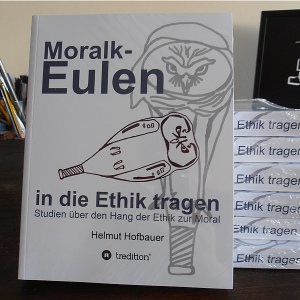Tagged: kantian ethics
New Book Out Now!
I am happy to announce that I have just published my sixth book: MoralkEulen in die Ethik tragen. Studien über den Hang der Ethik zur Moral (364 pages , 18 EURO, tredition, Hamburg 2014).
https://tredition.de/publish-books/?books/ID39239/MoralkEulen-in-die-Ethik-tragen
MoralkEulen in die Ethik tragen is a book on ethics. It raises the question why ethics was overruled by morals and the question of how a good human life can be lead has dropped out of ethics.
The word “Moralkeule” means a moral club or moral bat to “beat up” others with morals. It was elected to be the “non-word of the year” in 1998 because it combines a word like morals that has a positive connotation and is worthy of protection with an instrument for killing people. (Of course, by selecting non-words of the year the jury responsible for that is herself swinging the moral club.)
The title of the book suggests that bringing moral clubs or moral bats into ethics is like bringing owls (Eulen) to Athens or coals to Newcastle. Ethics has become a moral clubs-business. But why is that so? After all, ethics has started with the question what a good human life consists of.
The book is a collection of numerous short investigations studying questions like:
- Is the form of society we live in responsible for the school of ethics we chose for ourselves?
- Which ethics is appropriate for a static society and which one for a society where progress plays an important role?
- Which place is/was held by ethics/moral philosophy in contemporary philosophy, the philosophy of Aristotle, the philosophy of the Stoics, The Epicureans, of Plotin, of Thomas of Aquinas, of Francis Bacon, René Descartes, Thomas Hobbes, Immanuel Kant, Georg Friedrich Wilhelm Hegel, Auguste Comte, and Jean-Paul Sartre?
- Which questions are typical “ethical questions” according to a contemporary introductory book to that topic, and what do these questions have in common?
- Is testosterone responsible for Utilitarianism?
- Is the trend towards outsourcing responsible for the ethics boom of the last years?
- Does Jeremy Bentham want us to be machines?
- Are fantasies of omnipotence responsible for becoming a utilitarian (e.g. Peter Singer’s and Henry Sidgwick’s “point of view of the universe”?)
- Can Excel-sheets help the Kantian to manage the moral rules he gives himself?
- How much masochism is there in Kantian ethics (Kant wanted every person to kill all self-love and pride.)
- Isn’t John Rawl’s “veil of ignorance” actually a bogus argument (because behind the veil of ignorance you would lack the concrete experience needed to decide upon those questions Rawls asks you to decide upon behind the veil of ignorance)?
- Doesn’t Kant’s saying of “the starry heavens above me and the moral law within me” actually means that his moral philosophy wants us to seek orientation in dimensions that are to large for our lives on planet Earth (following the stars) making it impossible for us to conceive what is in front of our noses.
- Didn’t Kant actually have a specific form of government in mind when he formulated his ethics (namely a liberal state where all individuals are strong, a state without women, children, old people, handicapped people and other persons that cannot satisfy Kant’s requirements for a fully valid subject of action)?
- Can autonomy really consist in following rules?
- Is ethical behavior visible in ethical surroundings?
- Is it ethical to require people to act ethically instead of changing the social framework in order to become an ethical one?
- Wasn’t Machiavelli actually a Utilitarian?
- What does utility actually mean? (For if you are maximising utility by promoting the greatest good for the greatest number of persons, and these people are enjoying the utility created by you, they are obviously not following the utilitarian rule. Instead of enjoying, they too should maximise utility. But then, who is enjoying anything after all?)
- Why have three of the four cardinal virtues got lost?
- Should ethical subjects act morally in any circumstances, even when they are exhausted and physically and psychically at the end of their forces?
- When was the exact moment in history when the question of conduct of life has dropped out of ethics (I was not able to determine this point in time exactly, but at least I could state that in René Descartes provisional ethics it was still there whereas in Kant’s moral philosophy it was already lost. So this point in time was possible around the year 1700 A.D.)
- Why do we cultivate so many forms of one-sided communication in our present society (submitting scientific articles to journals, applying for jobs by filling out online forms, etc.), and is our concept of ethics as morals responsible for our readiness to accept unequal communication?
- How does ethics manifest itself in our contemporary world (ethics committees, ethical investing, CSR (corporate social responsibility, etc.), and what happens to the concept of human action when confronted with those examples of socially organised “good ethical practice”?
- And many more!
By writing MoralkEulen in die Ethik tragen, I have expressed a concern which I consider to be legitimate and vital for all human beings: By excluding the question of conduct of life from ethics, contemporary moral philosophers separate us from ethics: human beings cannot do anything good if they can’t integrate it into their lives. But what is even worse: concepts of good human lives are not discussed anymore in contemporary ethics. The consequence is that people today do not think anymore about how to lead good lives.
Or, sometimes they do try to think about this question, but they lack the appropriate words and concepts for doing that. They are taught by modern moral philosophy that ethically/morally good deeds are done by unspecified, unknown subjects of action possessing unknown capacities and resources. This is the manner how the program of academic philosophy to make people lose their concepts of practical reason and practical knowledge is performed nowadays.


